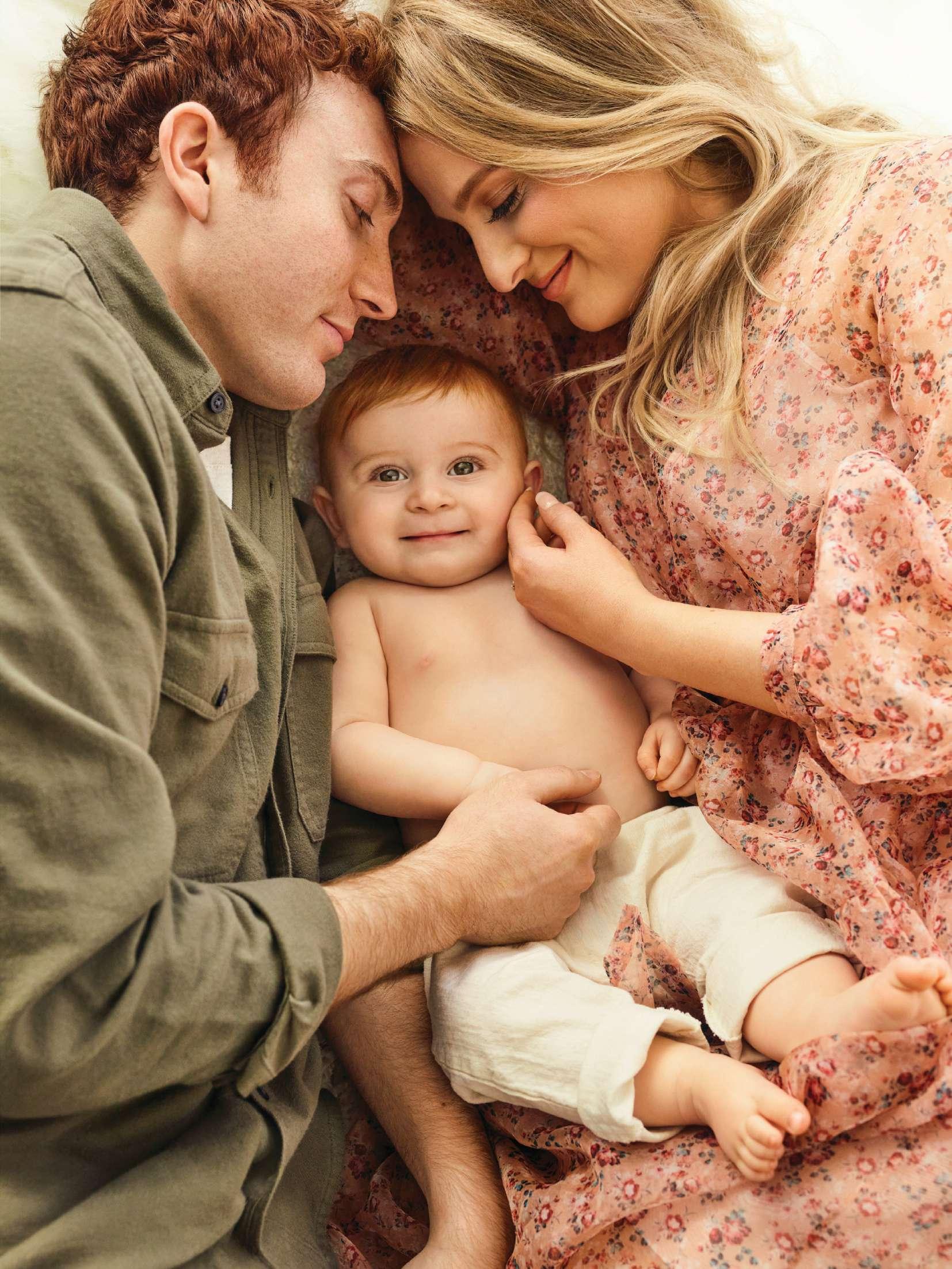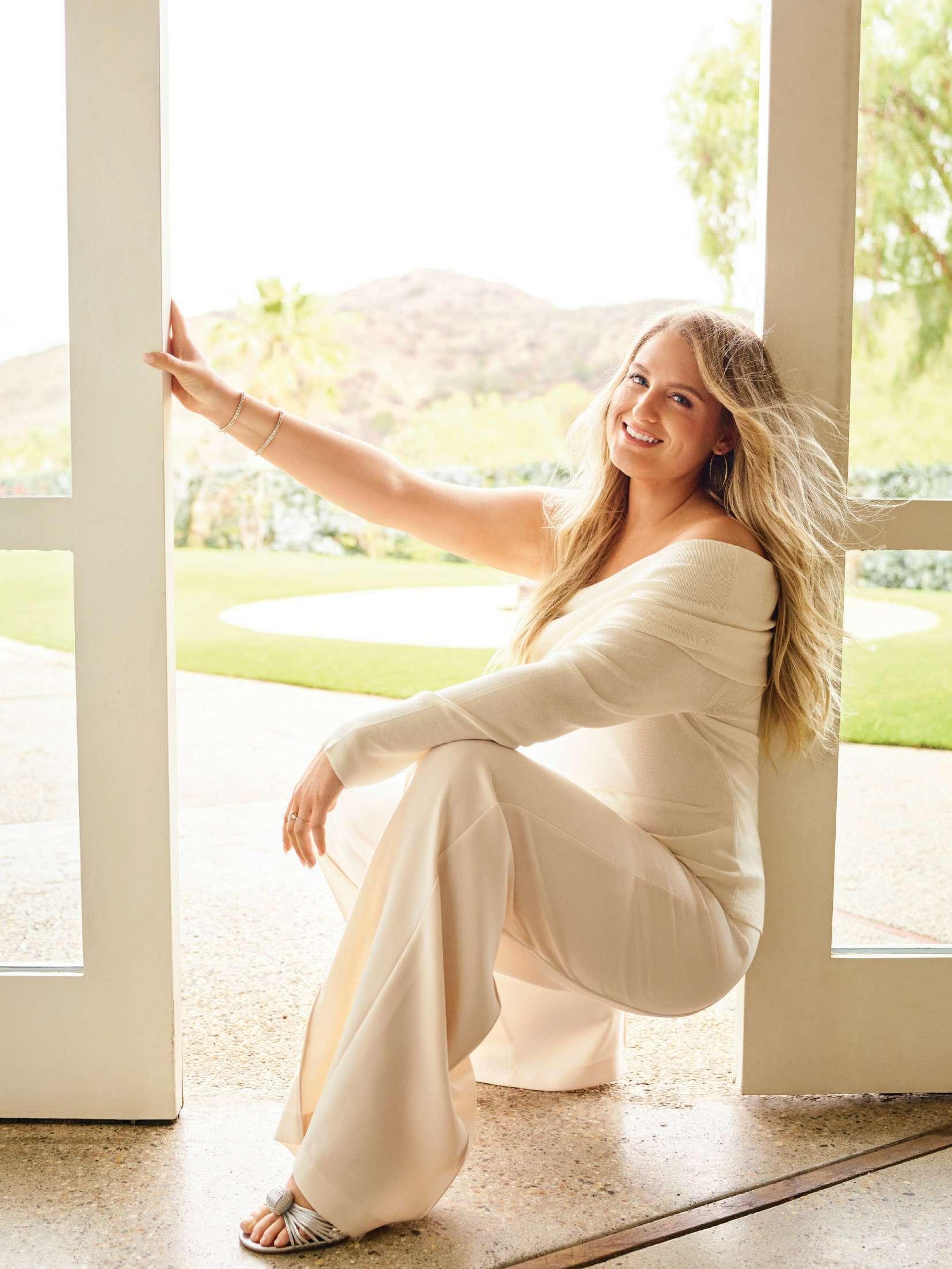
8 minute read
Sharing Her Truth
needed a change after sobbing in her bathrobe on a video call with her boss. She switched to a less-stressful role and reprioritized the mind-healthy habits she developed while dealing with postpartum depression for the past six years.
Of course, working moms often put physical exercise, good nutrition, and adequate sleep on the back burner. (Several experts I spoke to worry about the long-term impact of the sleep debt moms have accrued in the pandemic.) After the night I broke down, I called my
Advertisement
Increasingly, the systemic failures that hurt working moms are coming to light.
doctor. What I feared was depression was burnout, plus prediabetes, high cholesterol, and low vitamin D. Years of putting my health last—not exercising, making a meal out of my kids’ Halloween candy—was catching up. Now I’m happy if I run a few times a week. That’s what Dr. Lakshmin recommends too.
Agitating for Change
When the world shut down in 2020, law firm partner Sofia Beaumont (not her real name) spent more time cooking, exercising, and being with her kids. “The only negative in my life was my marriage. The disparity between our contributions to all aspects of our life was glaring. I told him what I needed, and it was clear he either couldn’t or wouldn’t meet those needs. He moved out, and we’re in the process of getting divorced,” she says. “For the first time in a decade, I’m taking care of my needs instead of prioritizing his.” Dr. Ziegler and Dr. Lakshmin say they’re inspired by what they hear from patients, who, like Sofia, are increasingly connecting their mental well-being with the social structures we live in. “They’re asking hard questions about power, gender roles, and inequity that they weren’t asking five years ago, and to me, that speaks to change,” Dr. Lakshmin says. Witness the growing number of working moms asking for paid family leave, paid sick leave, and child-care subsidies, says Eve Rodsky, the author of Find Your Unicorn Space: Reclaim Your Creative Life in a Too-Busy World and a member of Chamber of Mothers, a new advocacy group. “The antidote to burnout,” she says, “is living in a country that gives parents a safety net so they’re not drowning.” Working moms have never had a life preserver tossed their way, even when they’ve needed it most, and, yes, they’re angry about it. They’ve paid the price with their minds and bodies. But anger, Dr. Lakshmin says, is catalyzing politically and personally. “These changes can be very intimate,” she says. “It can be you standing up to your mother-in-law and saying, ‘I’m not going to make Thanksgiving dinner this year.’ Anger is powerful in our relationships and our own families—and that is where change happens.”
IF IT TAK ES A VILL AGE … W HERE IS IT ?
Experts cite these crucial gaps when it comes to support.
E M P L OY E R S : “I hear from thousands of mothers in our community about how difficult it is to combine a 40-hour workweek with 40-plus hours of housework and child care. It’s past time employers stepped up support for parents by providing backup child care, child-care subsidies, paid family leave, and truly flexible work options. On top of that, companies must make sure that working moms are being promoted through the ranks—and that we aren’t being penalized for taking advantage of these much-needed policies.”
—Blessing Adesiyan, founder and CEO of Mother Honestly
E L E C T E D L E A D E R S : “No amount of spreadsheets, meal prep, or flexibility will ever make up for our country’s lack of investment in families. Systemic shortcomings, like the skyrocketing cost of child care and barriers to paid leave, are pushing women—and our economy—to the breaking point. Elected officials need to stop forcing women to pick up the slack for their legislative inaction and start prioritizing real solutions.”
—U.S. Representative Katie Porter of California
PA R T N E R S : “Seventy percent of U.S. moms report working full-time jobs while carrying the lioness’s share of parenting and housework. Dads, it’s a simple formula to lighten the load for moms: 1) Make sure she gets the same amount of leisure and work time that you do; 2) Do what you’ve promised to do, without reminders, at a minimum standard of care that you and your partner agree on; 3) Communicate regularly by scheduling check-ins, and avoid providing feedback in the moment when everyone is stressed.”
—Eve Rodsky, author and advocate
H E R T R U T H
Birth was a lot. Early motherhood is tough —and wonderfu l. But raising son R i ley has helped Grammy-winning artist Meghan Trainor focus on her career goa ls and a lso her physica l and menta l hea lth. “I want to be the best for my kid,” she says.

by C A R I N A C H O C A N O , with additional reporting by PA M O ’ B R I E N photographs by P E G GY S I R O TA
M E G H A N T R A I N O R is best known for her diamond-certified pop smash “All About That Bass,” which debuted in 2014 when she was 21 years old. The anthem brought body positivity into the mainstream in the catchiest possible way. The song’s contagious, exuberant confidence made Trainor an icon of empowerment. But her forthcoming album, which she began working on during her first months of motherhood and which is set to release this year, comes from a more emotionally honest and vulnerable place.
“A lot of people ask me, ‘Your career’s poppin’ and you have a baby. How do you do it?’ ” Trainor, 28, says. She’s bouncing a 10-month-old Riley on her lap, his pacifier in his mouth. Husband Daryl Sabara, 29, the Spy Kids star and voice actor whom she married on her 25th birthday, hovers nearby. “ ‘How can you manage it all? How are you so happy?’ ” Trainor concedes that she is very happy but that childbirth and the first few months of her baby’s life were harder than anticipated.
The rewards of parenthood outweigh the bad stuff, of course. “When you get your prize, you’re like, ‘Oh my God, this was worth every stitch!’ ” she says of Riley’s delivery last February. Still, she says, “We had a lot of bumps.” She’s referring to her gestational diabetes, her cesarean, and her subsequent PTSD, not to mention Riley’s initial breathing problems, which landed him in the

NICU for his first five days. She was also unprepared for how hard breastfeeding would be. “When you google it or look it up on YouTube? They don’t tell you why it can suck. I’ll tell you why it might suck! Sometimes your nipples aren’t big enough for your baby’s mouth. I didn’t know that was humanly possible!”
Some of the new songs she’s written are sad, she says, because she’s committed to “telling the hard parts.” For instance, she says, “A lot of women are out there posting their stretch marks, and they write, ‘I love my tiger stripes, they gave me my boy.’ ” But she found it hard to love hers. “I love my baby, but I can’t look at my stretch marks and honestly say, ‘Wow, I love them,’ you know?”
For Trainor, “It feels like I’m telling my truth. I heard that when you have a baby, you get more creative, and my lyrics are changing. Instead of writing songs to make everyone feel better, I’m writing about how I feel in this moment. But it’s not like every day is sad. It’s more like: Yes, I am a badass, but this ain’t easy, and I have to get up and keep going.”
A self-described “nerd” about self-improvement, Trainor regularly consults a nutritionist and sees a therapist to tend to her mental health. She has spoken about the years it took to wrestle down her panic disorder. Life still serves up anxiety-inducing situations, but “I’ll lose control for a minute, then I snap back,” she says. “I’m proud.” She’s working on getting past an old habit of being self-critical, especially of her career. “When I’m singing in the booth, I’ll say stuff like, ‘Oh, I suck,’ you know? I have to learn to not say those things out loud, because if I do, then my brain believes them.”
Just as it says in her famous song, her mother did, indeed, tell young Trainor not to worry about her size. But she was insecure about her body nonetheless. “People say, ‘You wrote songs about how much you love yourself.’ And I say, ‘I wrote the songs because I needed them. Because I felt the opposite.’ ” Growing up on Nantucket, she and her two brothers played outside all day, but “we were always chubbier kids. We had a snack drawer in the house, and my mom was never strict about it,” Trainor says. Her pregnancy forced her to learn about blood sugar and study her own metabolism, and she hopes to pass her newly formed healthy habits on to Riley.
Trainor has always found a sense of security in her family, and they continue to be close. “I just felt super-loved by my parents. They were really good to us. Still are—they’re at our house every day. I think that’s why I always wanted to be a mom too,” Trainor says.
Sabara “is Superdad,” she says. He’s an early bird who takes Riley strolling at dawn and then brings Trainor coffee and oatmeal in bed, plus Riley, for some snuggle time. Afterward, Sabara takes Riley while Trainor works out for an hour, before they switch. Sabara also helps her stay organized. “He’ll actually

“I’ve never been more motivated,” Trainor says. She and husband Daryl Sabara, opposite, support each other through the parenting juggle.











